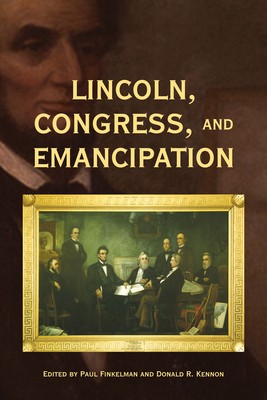
- We will send in 10–14 business days.
- Publisher: Ohio University Press
- ISBN-10: 0821422286
- ISBN-13: 9780821422281
- Format: 15.2 x 22.9 x 1.6 cm, softcover
- Language: English
- SAVE -10% with code: EXTRA
Lincoln, Congress, and Emancipation (e-book) (used book) | bookbook.eu
Reviews
Description
"When Lincoln took office, in March 1861, the national government had no power to touch slavery in the states where it existed. Lincoln understood this, and said as much in his first inaugural address, noting: 'I have no purpose, directly or indirectly, to interfere with the institution of slavery in the States where it exists.'" How, then, asks Paul Finkelman in the introduction to Lincoln, Congress, and Emancipation, did Lincoln-who personally hated slavery-lead the nation through the Civil War to January 1865, when Congress passed the constitutional amendment that ended slavery outright?
The essays in this book examine the route Lincoln took to achieve emancipation and how it is remembered both in the United States and abroad. The ten contributors-all on the cutting edge of contemporary scholarship on Lincoln and the Civil War-push our understanding of this watershed moment in US history in new directions. They present wide-ranging contributions to Lincoln studies, including a parsing of the sixteenth president's career in Congress in the 1840s and a brilliant critique of the historical choices made by Steven Spielberg and writer Tony Kushner in the movie Lincoln, about the passage of the Thirteenth Amendment.
As a whole, these classroom-ready readings provide fresh and essential perspectives on Lincoln's deft navigation of constitutional and political circumstances to move emancipation forward.
Contributors: L. Diane Barnes, Jenny Bourne, Michael Burlingame, Orville Vernon Burton, Seymour Drescher, Paul Finkelman, Amy S. Greenberg, James Oakes, Beverly Wilson Palmer, Matthew Pinsker
EXTRA 10 % discount with code: EXTRA
The promotion ends in 20d.02:37:18
The discount code is valid when purchasing from 10 €. Discounts do not stack.
- Publisher: Ohio University Press
- ISBN-10: 0821422286
- ISBN-13: 9780821422281
- Format: 15.2 x 22.9 x 1.6 cm, softcover
- Language: English English
"When Lincoln took office, in March 1861, the national government had no power to touch slavery in the states where it existed. Lincoln understood this, and said as much in his first inaugural address, noting: 'I have no purpose, directly or indirectly, to interfere with the institution of slavery in the States where it exists.'" How, then, asks Paul Finkelman in the introduction to Lincoln, Congress, and Emancipation, did Lincoln-who personally hated slavery-lead the nation through the Civil War to January 1865, when Congress passed the constitutional amendment that ended slavery outright?
The essays in this book examine the route Lincoln took to achieve emancipation and how it is remembered both in the United States and abroad. The ten contributors-all on the cutting edge of contemporary scholarship on Lincoln and the Civil War-push our understanding of this watershed moment in US history in new directions. They present wide-ranging contributions to Lincoln studies, including a parsing of the sixteenth president's career in Congress in the 1840s and a brilliant critique of the historical choices made by Steven Spielberg and writer Tony Kushner in the movie Lincoln, about the passage of the Thirteenth Amendment.
As a whole, these classroom-ready readings provide fresh and essential perspectives on Lincoln's deft navigation of constitutional and political circumstances to move emancipation forward.
Contributors: L. Diane Barnes, Jenny Bourne, Michael Burlingame, Orville Vernon Burton, Seymour Drescher, Paul Finkelman, Amy S. Greenberg, James Oakes, Beverly Wilson Palmer, Matthew Pinsker


Reviews